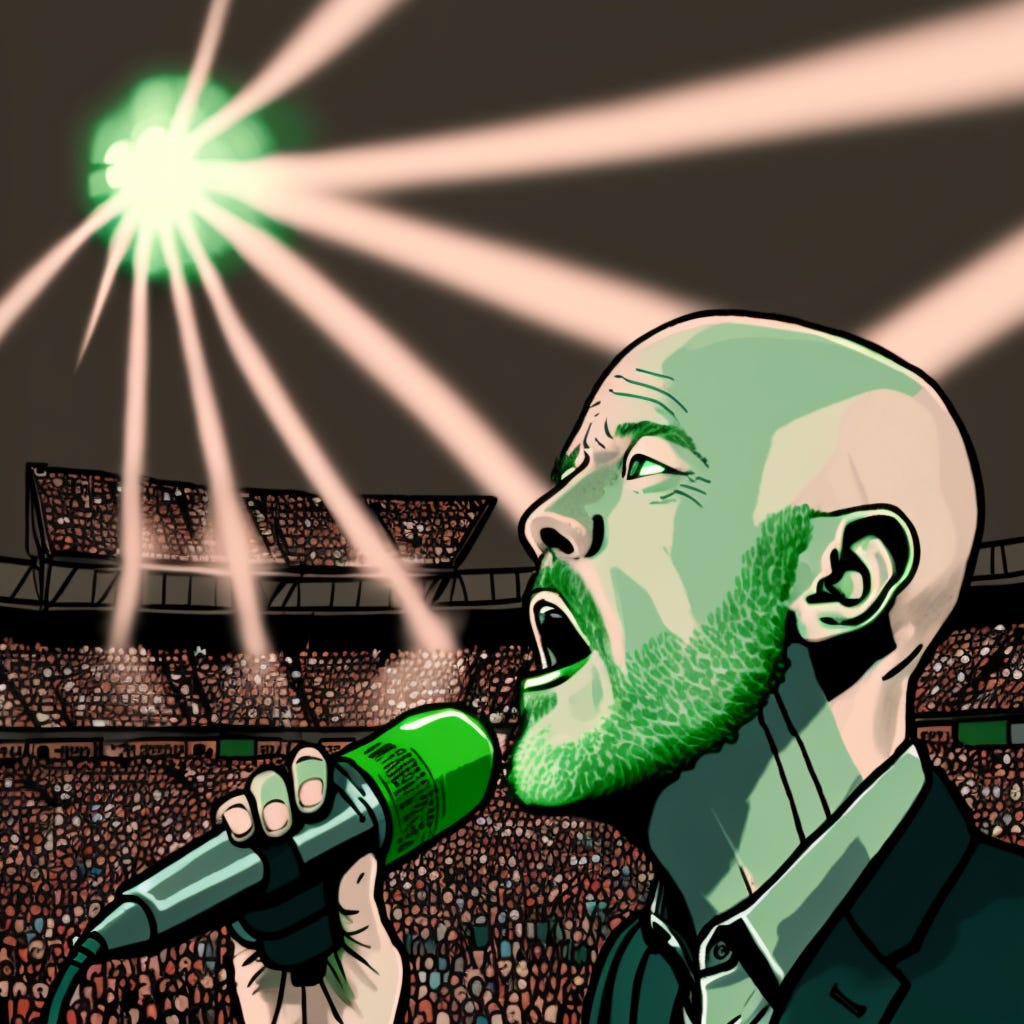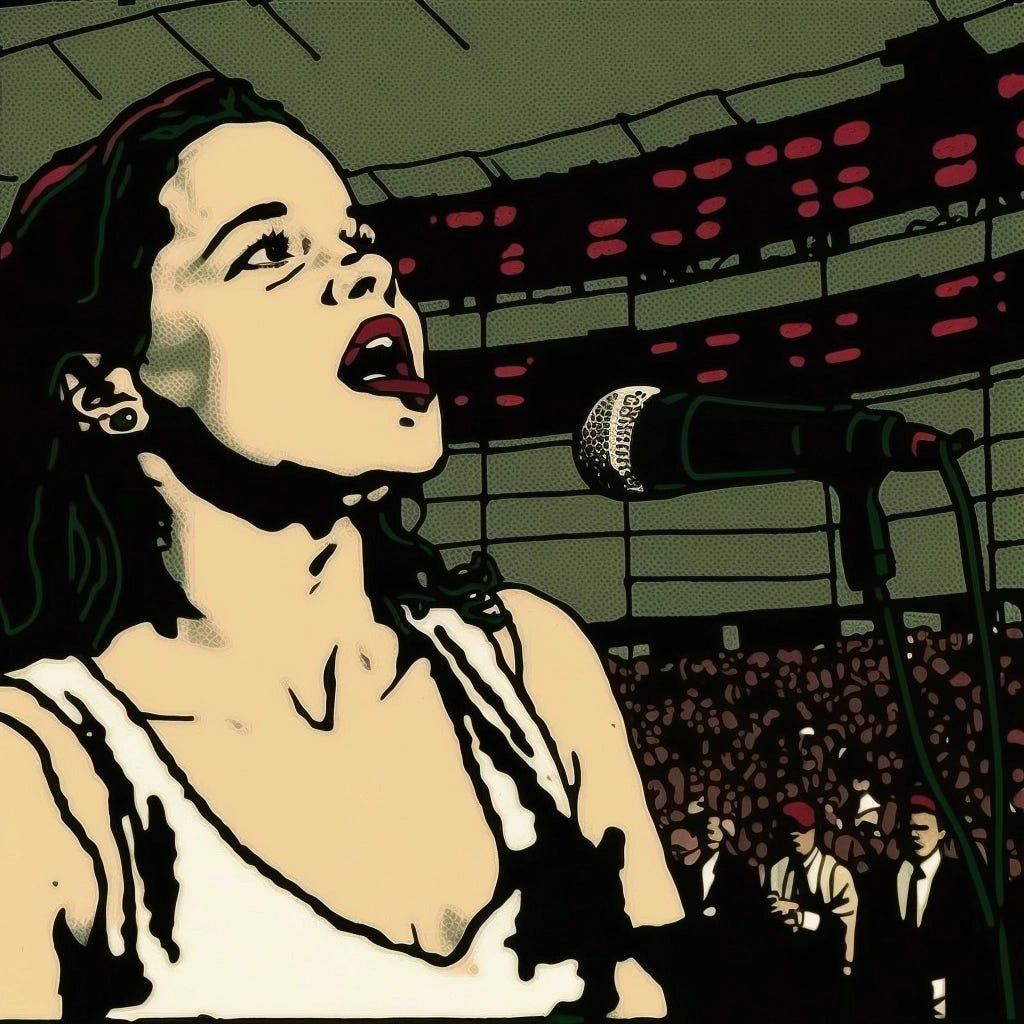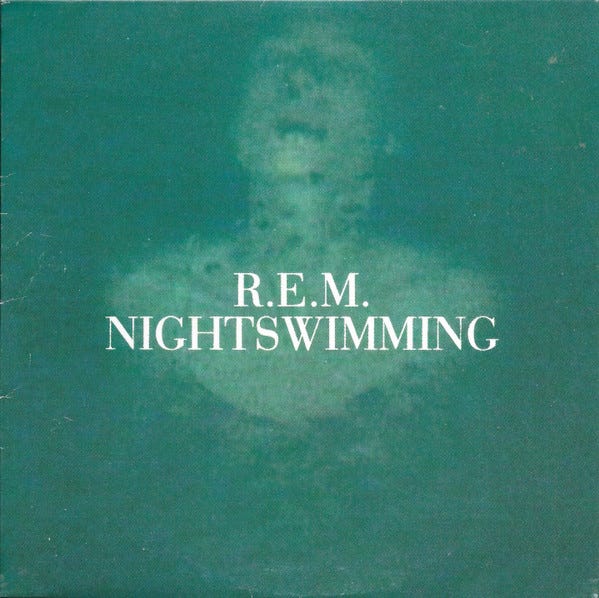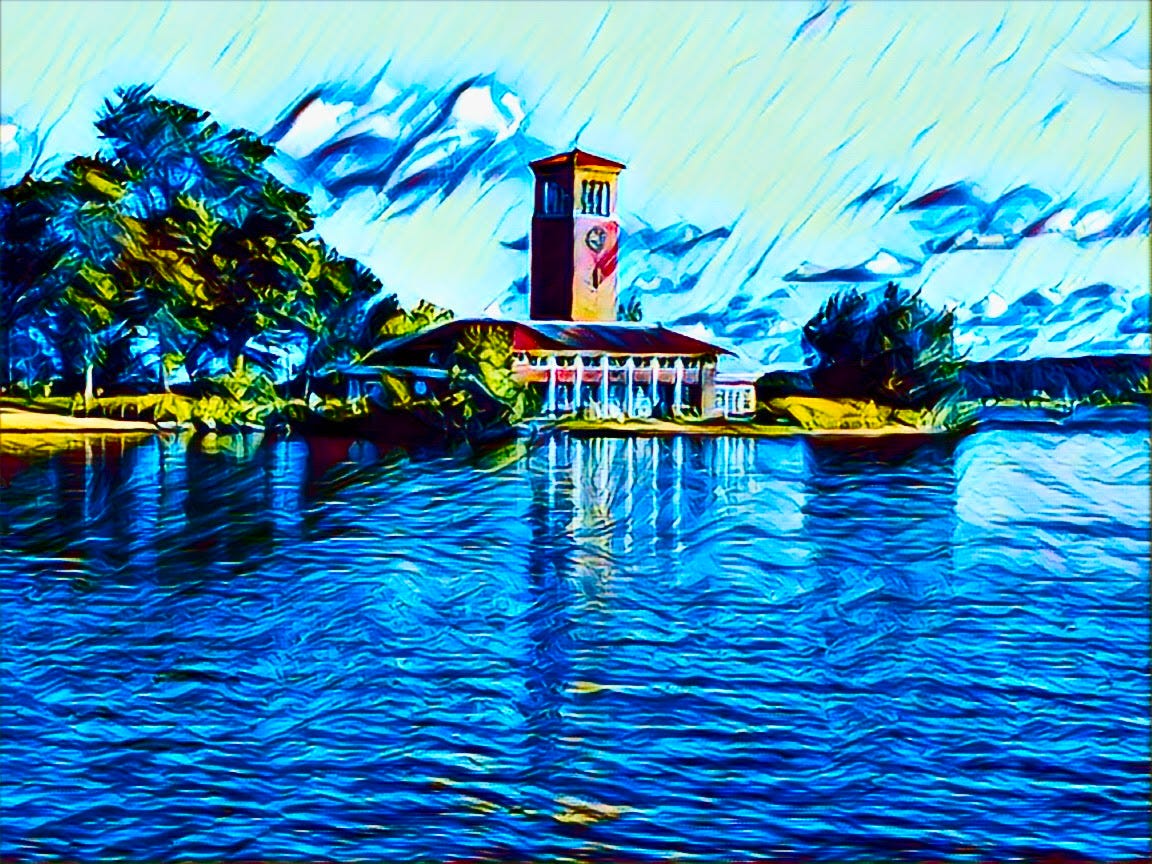Automatic For the People by R.E.M.
I've never been an R.E.M. superfan, but I was totally swept up in the summer of 1993 thanks to this record and a magical concert by 10,000 Maniacs.
Out of Time by R.E.M. wasn’t one of my favorite records. What a rude way to start an essay about R.E.M., right?
I didn’t dislike it, but it never felt like it was mine. It was my older sister’s. These were the days when it felt strange to own more than one copy of any record as a household. I think my sister had the cassette tape of R.E.M.’s Green, probably from one of those batches from BMG or Columbia House. I think she kept up her fandom when Out of Time came out, but I couldn’t swear to it. I just know that I didn’t own Out of Time, and I didn’t feel like R.E.M. was one of my bands.
I was more into rock rock and less into “college rock” at that point in my life. I had just turned 12 years old when “Losing My Religion” was released as a single in February of 1991. It was and is a good song, but with radio and MTV being what they were in those days, good songs became ubiquitous and played out quickly. I can’t tell you how many times I saw the video for “Losing My Religion,” but I can guarantee it was far more than your average human. I watched more MTV than most anyone I knew, and in those days we all watched quite a bit of MTV.
I had a strange relationship to the albums my sister liked or owned and how it related to me. I didn’t have any issue with my sister, but I wanted to carve out my path. I always wanted to be my own person. I fell in love with New Edition all on my own. Long after she gave up on Bon Jovi after Slippery When Wet, I was buying the tape of New Jersey. Even before I knew what emo was, I was an emo kid listening to “I’ll Be There For You” repeatedly. To this day, it’s one of those songs that my wife and I both love, but we’re wondering if we should be embarrassed about it. Like Tommy Boy singing along to the Carpenters on the open road, my wife and I are both moved by the Easy Cheese of “when you breathe, I want to be the air for you…” Richie Sambora harmonies are just the best. Anyway…
When it came to something like Guns ‘N Roses, I did everything I could to own it in my way, even though my sister had the Appetite tape and I only had a dubbed copy with hand-written songs on the label of my Memorex tape. I didn’t want to be a fan through the lens of anyone else. It’s nothing against my sister, either. With my friends, I wanted to be the first one in the door who discovered the music. But obviously, sharing a house made the situation more immediate.
I remember feeling like, “O.K. She owns Billy Idol’s tape, and I don’t need any part of that.” I also was fine steering clear of Wham! and some of the poppier things. Those felt more like “girl” tapes to me at the time. I was already judging and slotting things at an early age. However, for every one of those decisions, I feel like I missed out by categorizing INXS as “one of hers.” By the time “Beautiful Girl” blew my mind on the radio, I felt like I had missed the boat on INXS. Whoops! What can I say? I was young and dumb and was missing the larger point. Music is for everyone, and we all have our relationships with the art regardless of anyone else. It’s an important context for R.E.M., because I didn’t really consider them one of my bands.
That is, until the summer of 1993.
For most of my life, my family spent time during the summer in Chautauqua, New York. It’s a lake community that is centered on the arts and religion. It’s a place where people gather from around the country and the world for the summer. There are concerts. There are lectures. in 2022, you probably heard about Salman Rushdie being stabbed on stage? That is Chautauqua. Not a great thing, but hosting a person like Rushdie is the kind of place Chautauqua has always been. The summer of 1992 is when Bill Clinton and Al Gore made a campaign stop in Chautauqua. That was a wild summer with Secret Service scouting the place out for a week or so ahead of time. It wasn’t all high-level culture all the time.
The other part of summers in Chautauqua was hanging out at the Youth Activities Center (YAC) with all sorts of music playing while we passed the time playing ping pong, Q-Bert, or doing not much at all. If you went to college, do you remember all the “get to know you” conversations you had comparing and contrasting your upbringing from different places? I was well-prepared for that in college because I’d already been through it with kids growing up in Chautauqua. We shared different words for things, different sports, and different accents. And over the course of the summer, whatever was happening in popular culture would impact us together.
In 1993, one of those things was R.E.M.’s Automatic For the People. Specifically, “Nightswimming.” But before we get there…
The summer of 1993 was especially magical in Chautauqua. For those who don’t know, CHQ is very close to Jamestown, New York. Jamestown is the hometown of Natalie Merchant and her former band, 10,000 Maniacs. They were finishing up a huge tour in support of their record Our Time in Eden. They had also played President Clinton’s inaugural ball in January, produced by MTV. Eden was a phenomenal album, and we were complete and utter homers for the band because we felt like we had a special connection to them. The Maniacs always dreamed of playing at Chautauqua’s large outdoor Amphitheater, and on a Friday night in 1993, they did just that.
The Jamestown Post-Journal wrote it up later.
For Friday night's show, however, dancing was a priority, and the Institution complied with the fans' need for space by removing the benches in the lower half of the Amphitheater. "I hope you all brought your dancing shoes, because they had to tear out the benches," Gustafson said. The Amphitheater's seating capacity is normally 5,500, but the crowd size swelled more than that number, pushing people to the outer walls and on to the Institution grounds.
However special a night you can imagine seeing a band, multiply it by 100. Chautauqua is a small community of lifers, so down in that pit of dancing people in front of the stage, we knew people everywhere. The swim counselor who taught you how to put your face in the water next to the kid who paddled the canoe with you last week, next to the girl you dreamed about being your first kiss. And the girl who probably was your first kiss.
Today, I walk around Chautauqua with my wife and kids in the summertime and see people with their kids who were there with me 30 years ago this summer back in 1993. I haven’t kept up with all of them consistently for the past 30 years, but you can’t take away some of our common backgrounds, including these musical commonalities.
That inaugural ball for President Clinton? MTV produced it, and Michael Stipe joined the 10,000 Maniacs for a few songs.
Finally I’m going to talk about “Nightswimming.”
For us, “Nightswimming” was the unofficial song of the summer. I say “unofficial” because many websites have gone back and named their own “song of the summer” for the past 50 years. Sometimes it works for me, like 1991’s “(Everything I Do) I Do it For You,” by Bryan Adams. If you believe those lists, for most of the country, the song of the summer was “Baby Got Back” by Sir Mix-A-Lot. But for us, it was “Nightswimming.”
R.E.M. was already a big band in the culture. By this point, anyone who was discovering R.E.M. had missed out on the entire first half of the story. Sure, they were probably in time for the peak. But most of us who arrived late missed all the stuff from I.R.S. records and the band’s ultimate departure of the small label world for Warner Bros. That resulted in the release of Eponymous, which was a compilation / best of from their releases prior to Warner’s first release, Green in 1988. It wasn’t my fault as a person born in 1979. I just wasn’t there for it.
In our own way as tender, young teenagers who had been pelted with singles for more than six months including “Drive,” “Man on the Moon,” “The Sidewinder Sleeps Tonite,” and the impossibly big “Everybody Hurts,” we thought we were living in the deep cuts with “Nightswimming.”
Whenever that track’s piano open came on over the speakers in the YAC, we all perked up in a way that we couldn’t imagine people perking up anywhere else. One of the guys who worked there for the summer behind the counter pushing candy and grilled cheeses back at us was the unofficial big brother on duty. He was all about the song and would intentionally make a big deal just looking around the room and mouthing the words after the piano chords welcomed in Michael Stipe’s distinct voice.
Nightswimming deserves a quiet night
The photograph on the dashboard, taken years ago
Turned around backwards so the windshield shows
Every streetlight reveals the picture in reverse
Still, it's so much clearer
I forgot my shirt at the water's edge
The moon is low tonight
And as we were the same exact age where our voices would crack from time to time, we were listening to Michael Stipe - one of the unlikeliest rock stars we could imagine - who turned a cracking vocal into a part of his unlikely rock star style. As we grappled with getting older and all the struggles with identity and who we were today versus who we wanted to be tomorrow, we had an album that went a little deeper than many other things on the radio. And as the summer wound down, the words felt that much more perfect.
Nightswimming, remembering that night
September's coming soon
I'm pining for the moon
And what if there were two
Side by side in orbit
Around the fairest sun?
That bright, tight forever drum
Could not describe nightswimmingYou, I thought I knew you
You I cannot judge
You, I thought you knew me
This one laughing quietly underneath my breath
Nightswimming
It was the first time in my life that I’d come to feel like a band was my very own even though I was essentially a bandwagon fan. It was an important lesson for me to be open to letting the universe guide me a little bit. I’m doing my best to explain the context here 30 years later, but it still feels somewhat impossible. So much of what I talk about here would be easier to just wave away and say, “You had to be there.” As I get older, it’s not good enough though. I feel this need to explore how it all happened because I feel like I can better understand the art and it’s innate ability in completed form.
In the time, it didn’t matter if I couldn’t make anyone understand after I went back home a month later. It wouldn’t matter when I’d try to explain to my fellow metal fans why I loved Automatic for the People despite conversations about Meshuggah and other technical musical marvels that couldn’t be more different.
For me, the hardest thing about being a music fan was that as an identity, I didn’t feel like I fit in with any of it. I loved heavy music, but I didn’t have the right clothes, hair, piercings or tattoos for the scenes. Then when I got into indie and emo, I didn’t have the right fit for those scenes either. When all my favorite bands felt like they fit into a class of hipster adults, I couldn’t make the skinny jeans and large-rimmed glasses a part of my look. Over time, I would realize that nothing could feel authentic except my awkward version of reality moving in and out of genres.
I’d like to think some of this was born of connecting with weird and different things for reasons other than scene and identity growing up in places like Chautauqua. Sure, as people who congregated in a small place in the summertime, we had our own identity, but it was an identity of openness that I didn’t feel anywhere else.
You never know what will serve as the glue in situations like these. In the summer of 1993, it was music, most notably that Maniacs show and Automatic for the People, and their soon-to-be single “Nightswimming.”
And instead of saying, “You had to be there,” I try to explore it, explain it, and wish everyone was there with me.







